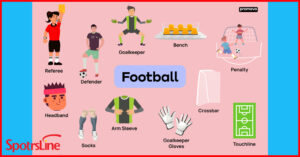
Free Hit in Football: A Game-Changer
In football, a Free Hit isn’t an official term, but it’s strategically important. It’s like when a team gets to reset and adjust their game plan after a foul. This concept, similar to free kicks in football, can change the game by giving teams the chance to take control.
Understanding a Free Hit is more than just knowing when the referee blows the whistle. It’s about understanding how these moments can shift momentum and create scoring opportunities.
In this article, you’ll learn about:
- How free kicks work in football.
- How Fantasy Premier League (FPL) fans use the Free Hit chip to manage their teams better.
- Strategic considerations for using Free Hits both on and off the field.
Let’s explore how mastering Free Hits can improve your football strategy.

Understanding Free Hit Chip in Fantasy Premier League (FPL)
The Free Hit chip is a powerful tool in the world of Fantasy Premier League (FPL). It allows managers to make unlimited transfers for a single gameweek without affecting their long-term squad. This flexibility can be a game-changer during challenging fixtures or when unexpected events like injuries or postponements occur. Once the gameweek concludes, your team reverts back to its original lineup, as if the free hit never happened.
How does it differ from other chips?
Wildcard
Unlike the Free Hit, a Wildcard lets you permanently change your team with unlimited transfers. It’s useful for overhauling your squad but once played, you can’t go back to your previous setup.
Bench Boost
This chip enables points from all 15 players in your squad, not just the starting XI. It’s best reserved for double gameweeks when many of your players have two matches.
Triple Captain
Here, your chosen captain scores triple points instead of double. Timing is everything with this chip, often used during favorable fixtures.
Importance of Free Hit for Team Management
Understanding when and how to use the Free Hit chip is crucial to effective FPL strategy. It provides an opportunity to:
- Navigate tricky fixtures where key players are absent.
- Capitalize on weeks with multiple matches or unexpected team changes.
- Avoid taking costly transfer hits which could negatively impact your overall rank.
Playing it wisely can give you a significant edge over competitors who may not have planned as strategically.
How Free Kicks Work in Football
In football, free kicks are an exciting part of the game that can quickly change the outcome of a match. They are given when a player breaks the rules or commits a foul. It’s like giving the other team another opportunity, and knowing this can make you enjoy the game even more.
Difference Between Direct and Indirect Free Kicks
There are two main types:
- Direct Free Kick: This allows the attacking team to score directly from the kick. It’s typically given for more serious fouls such as handball (by players other than the goalkeeper), or physical offenses like tripping, pushing, or holding an opponent. Think of it as having a direct path to goal glory.
- Indirect Free Kick: Requires that another player touch the ball before a goal can be scored. Awarded for less severe infractions like offside positions or dangerous play without contact, it demands strategic passing rather than an immediate shot on goal.
Rules Governing Free Kicks
- Spot of Execution: Must be taken from where the foul occurred.
- Distance from Opponents: Opponents should stand at least 9.15 meters (10 yards) away until the ball is in play.
- Ball Stationary: The ball must not be moving when kicked.
Referees sometimes allow quick free kicks, catching defenders unprepared and creating unexpected scoring opportunities. Teams often employ creative tactics during these moments, such as forming walls to shield direct shots on goal or using players known for their precision kicking skills.
Understanding these mechanics not only enriches your knowledge of football’s rules but also highlights how teams strategize to turn these situations into scoring chances.
When to Use the Free Hit Chip
Deciding when to use the Free Hit chip in Fantasy Premier League (FPL) can be a game-changer. Identifying the perfect scenario plays a crucial role in maximizing your team’s potential.
Ideal Scenarios for Using the Free Hit Chip
1. Blank Gameweek (BGW)
This is perhaps the most common situation where managers opt for a Free Hit. During a BGW, certain teams may not play at all, leaving you with fewer players to field. The Free Hit allows you to assemble a full squad for that week without affecting your long-term strategy.
2. Double Gameweek (DGW)
Another strategic use is during DGWs, where teams play more than once in a single gameweek. By activating the Free Hit, you can temporarily bring in players who have multiple fixtures, thereby increasing your chances of accumulating points.
Timing Considerations for Mini-Leagues
In competitive mini-leagues, timing your Free Hit effectively could be the difference between winning and losing. Observing your competitors’ moves and anticipating their strategies can provide an edge. For instance, if rivals are heavily impacted by a BGW, using your Free Hit then could propel you ahead.
Impact on Transfers During Specific Gameweeks
Using the Free Hit chip resets any transfers you’ve made that week back to your original team after the gameweek concludes. This makes it imperative to consider its activation wisely—especially when dealing with potential price changes or injuries. It’s like hitting pause on your transfer plans for a week, giving you flexibility without long-term consequences.
Deploying the Free Hit chip isn’t just about filling gaps or exploiting opportunities; it’s about timing and strategy, ensuring you’re always one step ahead of unexpected gameweek challenges.

Strategies for Using the Free Hit Chip Effectively
Using the Free Hit chip in Fantasy Premier League (FPL) can be a game-changer when used correctly. Here are some key tactics to make the most out of this powerful tool:
Maximizing Players During a Free Hit
- Fixture Analysis: Before activating your Free Hit, thoroughly analyze the upcoming fixtures. Target teams with favorable matches and high-scoring potential.
- Form Players: Prioritize players who are in good form. They are more likely to provide returns, so capitalize on their momentum.
Identifying Target Differentials
- Look for Hidden Gems: Differentials, or players with low ownership, can be pivotal during a Free Hit. Seek out those who may have flown under the radar but have shown promise or have an advantageous fixture.
- Emerging Talents: Keep an eye on emerging talents or returning players from injury that could make a significant impact.
Balancing Short-Term Gains with Long-Term Strategy
- Immediate Returns vs. Season Plan: While the Free Hit allows you to focus on immediate gains, it’s crucial to ensure these decisions don’t negatively affect your longer-term strategy.
- Team Value Considerations: Be cautious of fluctuating player prices and how they might impact your team value once your standard squad returns post-Free Hit.
A well-executed Free Hit can propel you up the mini-league standings if used strategically. By focusing on player form, fixture analysis, and identifying differentials, managers can leverage short-term advantages without compromising long-term plans.
Impact of Injuries and Suspensions on Team Management
Dealing with injuries and suspensions can feel like navigating a minefield for any Fantasy Premier League (FPL) manager. These unexpected challenges require quick thinking and strategic adjustments to maintain a competitive squad.
How Injuries Affect Squad Decisions
An injury to a key player can throw your entire game plan into chaos. Suddenly, you’re faced with the challenge of filling that gap without compromising the overall strength of your team. The uncertainty around the return date adds another layer of complexity, making it vital to have a flexible plan in place.
Using the Free Hit to Navigate Suspensions Effectively
Suspensions can be just as disruptive, often catching managers off guard right before crucial matches. This is where the Free Hit chip becomes an invaluable tool. By activating the Free Hit, you can make temporary changes to your squad for one gameweek, allowing you to sidestep these suspensions effortlessly. It’s like having a reset button that lets you field a full-strength team despite these setbacks.
Planning Around Postponed Fixtures
Postponed fixtures are another reality of football management. They can lead to blank gameweeks where several players might not have matches at all. With careful planning, the Free Hit chip enables you to adjust your lineup specifically for these tricky periods. It allows for temporary fixing of the squad, ensuring you maximize points even when regular starters are sidelined due to unforeseen schedule changes.
By understanding these dynamics and leveraging tools like the Free Hit chip strategically, you can maintain a resilient FPL team capable of weathering any storm that injuries or suspensions might bring your way.
Using Transfers in FPL with a Focus on the Free Hit Chip
In Fantasy Premier League (FPL), transfers are key to your team’s success. When you activate the Free Hit chip, you get a special chance to make unlimited transfers for one gameweek without any cost. This feature gives you flexibility, letting you adjust your team to take advantage of good fixtures or deal with unexpected issues like injuries and suspensions.
The differences between standard transfers and those allowed with a Free Hit are important. Normally, managers get one free transfer per week, with each extra transfer costing points. But during a Free Hit week, these limits don’t apply. You can change your entire squad for that specific gameweek, going back to your original lineup afterward. This is especially useful for handling tough gameweeks where regular starters might have difficult matches or when certain teams play twice.
Managing price changes well becomes crucial when using the Free Hit chip. Player values go up and down based on market activity, and while these changes don’t affect the Free Hit lineup directly, they can impact future planning. For example, if a player gains value during your Free Hit week but isn’t in your original team after activation, you may need to plan on getting them later without breaking your budget. To avoid such scenarios, it’s beneficial to consider building team value early in the season, which can provide more flexibility in future transfers.
Understanding these factors helps make the most of the Free Hit chip, letting managers take advantage of opportunities as they come while keeping an eye on long-term goals in their FPL journey.
Common Mistakes to Avoid with the Free Hit Chip
Using the Free Hit chip can be a game-changer in Fantasy Premier League (FPL), but it’s not without its pitfalls. Many managers fall into common traps that can diminish its potential impact. By understanding these mistakes, you can learn how to use the Free Hit effectively and boost your FPL performance.
Common Errors:
- Poor Timing Decisions: Managers often activate the Free Hit chip during weeks when their team is already well-set. This results in minimal gains because the existing squad could have performed equally well without the chip.
- Ignoring Fixture Difficulty: Some players get lured by big names rather than assessing match difficulty. A star player facing a tough defense might not yield as many points as a lesser-known player with an easier fixture.
- Overlooking Long-Term Strategy: The Free Hit is sometimes used impulsively, disregarding how it fits into a broader plan. This shortsightedness can lead to missed opportunities in subsequent gameweeks.
Tips for Better Outcomes:
- Plan Ahead: Analyze upcoming fixtures several weeks in advance to identify potential gaps or challenges where the Free Hit would be most beneficial.
- Balance Risk and Safety: While it’s tempting to fill your squad with high-risk differential picks, maintaining a core of reliable point-scorers ensures stability.
- Consider Opponent’s Form: Evaluate not just individual player form but also their opponents’ recent performances.
By avoiding these common mistakes and following these tips, you can maximize the effectiveness of your Free Hit chip and stay ahead in your mini-leagues.
Conclusion
The Free Hit chip in Fantasy Premier League (FPL) is a strategic tool for managing your team. It allows managers to temporarily change their team for one gameweek, giving them flexibility to handle unexpected problems like injuries or suspensions.
Knowing when to use the Free Hit chip is important. This includes times when multiple matches are postponed or during blank and double gameweeks, where getting the most points possible is crucial.
Understanding how this chip works helps avoid common mistakes and make better transfer decisions. Balancing short-term gains with a long-term plan is key to success.
With careful planning and execution, the Free Hit chip becomes an invaluable asset in any FPL manager’s toolkit, turning challenging situations into opportunities for significant point hauls. Use this powerful strategy to improve your FPL experience and climb those mini-league tables!
FAQs (Frequently Asked Questions)
What is a Free Hit in football?
A Free Hit in football refers to a special chip used in Fantasy Premier League (FPL) that allows managers to make unlimited transfers for one gameweek without any penalty, enabling them to optimize their team for specific match conditions.
How does the Free Hit chip differ from a Wildcard?
The Free Hit chip allows you to make unlimited transfers for a single gameweek only, after which your team reverts to its previous state. In contrast, a Wildcard enables you to make unlimited transfers across multiple gameweeks without reverting back.
When is the ideal time to use the Free Hit chip?
The ideal scenarios for using the Free Hit chip include during Blank Gameweeks when many teams have no fixtures and Double Gameweeks when several teams play twice. Timing considerations are crucial for maximizing its impact on mini-leagues.
What are some strategies for effectively using the Free Hit chip?
To maximize the effectiveness of the Free Hit chip, focus on targeting differentials—players with low ownership who may perform well. Balancing short-term gains with long-term strategy is also essential, as well as best practices for selecting players.
How do injuries and suspensions affect team management with the Free Hit?
Injuries and suspensions can significantly impact squad decisions. The Free Hit can be utilized to navigate these issues effectively by allowing managers to temporarily fix their squad while planning around postponed fixtures.
What common mistakes should be avoided when using the Free Hit chip?
Common errors include failing to plan for future gameweeks or overloading on players from one team. To achieve better outcomes, it’s important to avoid these pitfalls and ensure that your selections align with both immediate needs and future strategies.


One thought on “Free Hit in Football: A Game-Changer”